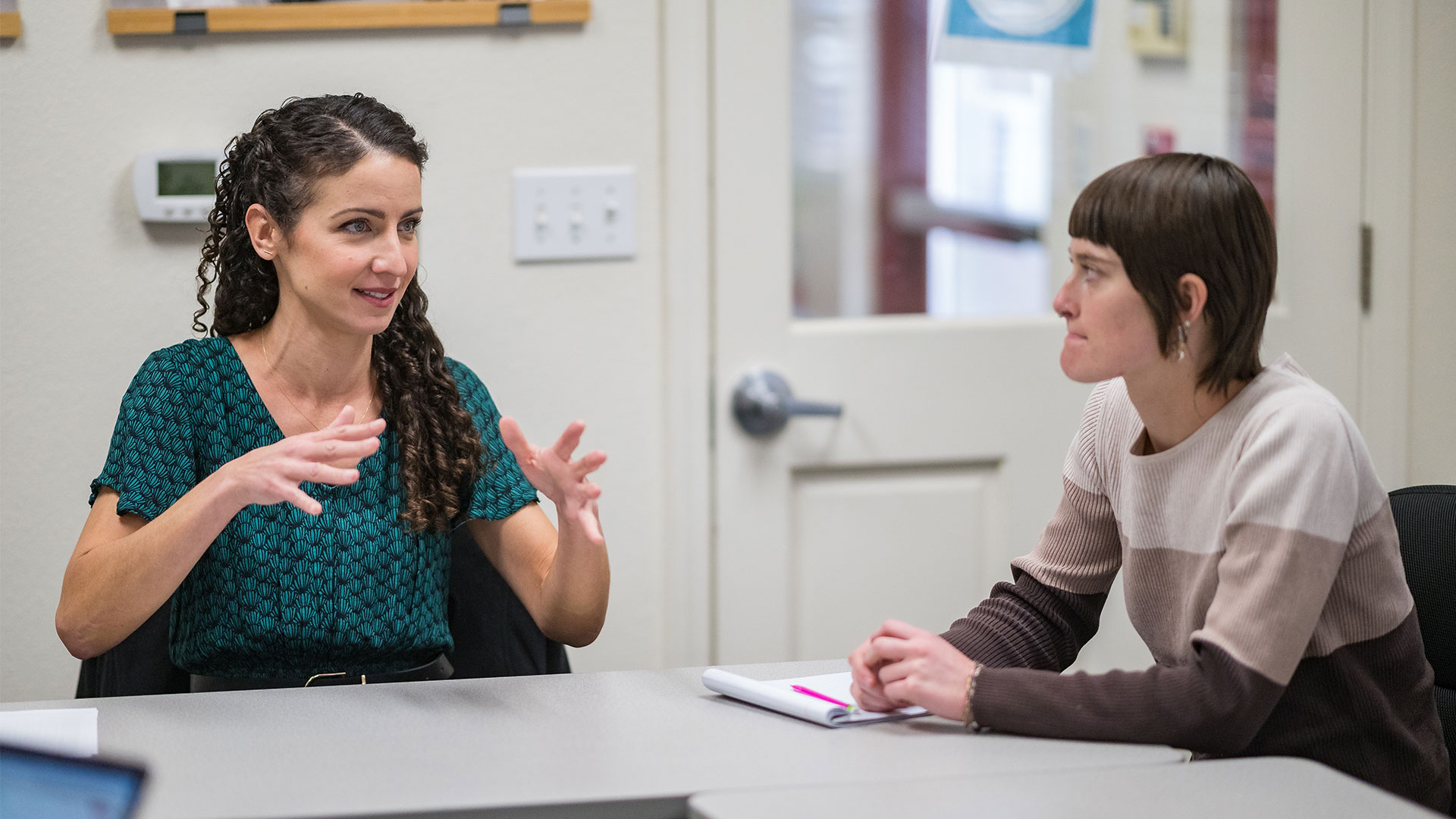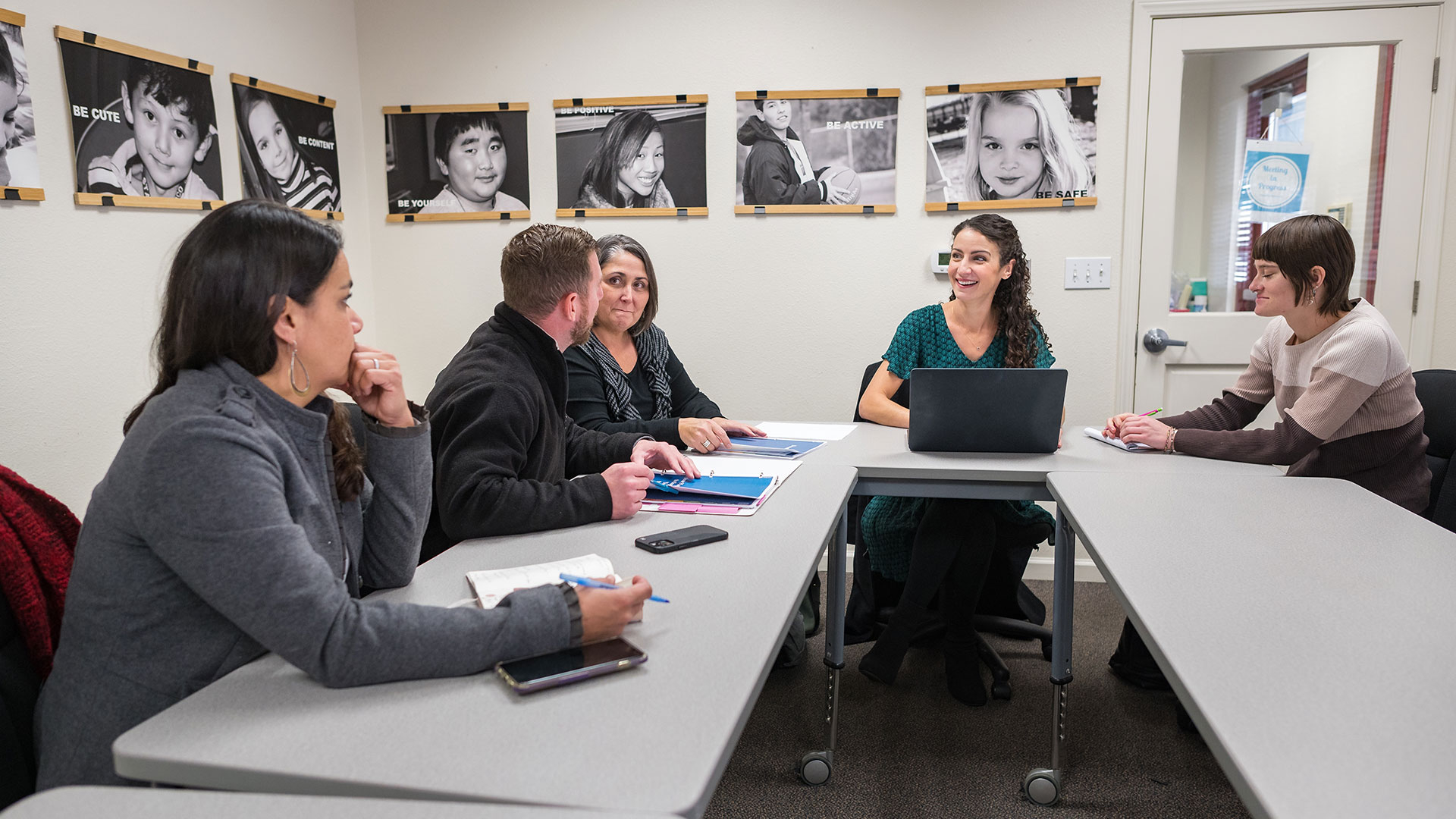Professor Pens Wildfire Playbook to Guide Community Preparedness

Lindsey Nenadal (left) and Courtney Peria (right) discuss edits with the team from the Boys and Girls Club of North Valley. (Jason Halley/University Photographer/Chico State)
Important conversations can be difficult.
They start at home. Think of ‘stranger danger,’ one of the first serious talks parents have with kids when they’re old enough to understand.
And then they follow us through our schooling and professional lives—what do you do if there’s an earthquake or shooter?
Here’s a big one that regularly takes the stage: what to do if there’s another wildfire?
It’s an especially difficult discussion. But monumentally important. And while individual answers might vary depending on variables like where you live, community organizations and agencies who serve on the frontlines of an event like this should have a firm grasp.
This is the idea behind a new ‘wildfire playbook’ led by Lindsey Nenadal, assistant professor in the Department of Childhood Development.
With support from a team at the Boys and Girls Club of the North Valley and a group of Chico State undergraduate students, she spent two years interviewing and learning from community members who worked with children and families during and after the Camp Fire—and then used those insights to craft a handbook for organizations facing a similar crisis. It covers everything from immediate needs and considerations on day one to managing a displaced family’s long-term needs.
After a lengthy editing and refining process, the book is now available to download or print for free.
Let’s backtrack a moment.
Nenadal understands difficult conversations. Her early work and research centered on them.
After graduating from Chico State (Liberal Studies, ’05; Credential, ’06), she went on to teach elementary school for several years, before earning an MA and PhD in education with an emphasis in human development and psychology from University of California, Los Angeles. There, her research focused on talking to children about wealth and poverty, and on teachers’ beliefs about biases based on social class. Her work felt personally and professionally meaningful.
Then, in 2018, while she was supporting teachers and conducting research in Los Angeles, the Camp Fire stopped time. The deadliest and most destructive wildfire in California history displaced tens of thousands of people living mere miles from Chico, upended lives, and opened a whole new realm for understanding and planning for disaster.
“I grew up in Paradise—it’s very near and dear to my heart,” Nenadal said. “When the Camp Fire took place, my family was still living there, plus a lot of friends. This obviously had a huge impact on me.”
Grief has a way of reshaping the geography of our hearts and bodies. And often, it can spur us to reshape our lives. Nenadal was compelled to return to Butte County to find some way to take part in shared efforts to support, rebuild, and heal the community that raised her.
By 2019, Nenadal had accepted a position at Chico State and shifted her focus to trauma and wildfires.
As colleagues, staff, and students across disciplines found ways to integrate the fire into their curriculum, she began reaching out to potential partners about ways to work with families affected by the Camp Fire.
At the Boys and Girls Club, she found a spot on the Paradise Community Leadership Board. It was there, at a board meeting discussing how to support nearby towns affected by the 2020 North Complex Fire, she heard the nonprofit’s CEO Rashell Brobst (Recreation Administration, ’95) say something that caught her attention: “If only there was some way we could put down everything we learned from the Camp Fire into a playbook for other communities.”
Nenadal’s next project was set in motion.
“I knew that was how I could start giving back and working and helping and using the tools and skills I have as a trained researcher,” she said.
Almost immediately, she approached Brobst and began sketching out ideas. Scott Dinits, human resources director at Boys and Girls Club of North Valley, and Erin Kennedy, case managing supervisor, helped identify community partners who could provide firsthand insight and navigate delicate conversations.
“We had to prepare all of our partners. I wanted them to know that their experience is important and impactful,” said Kennedy. “This book is not about what we did. It’s about them and everything they’ve endured with families. It’s about honoring their efforts.”

In this way, the process of writing it was built on and from firsthand knowledge, insights, and takeaways that can only come from facing the unthinkable. “Every interviewee’s personal experience inspired an idea, raised a new point, and helped make this highly user friendly to whoever unfortunately will need to use it in the future,” Nenadal said. “We were constantly asking ourselves how we would use this book in the moment of an emergency. What would make the most sense? What would we need to see first and second to make it as user friendly as possible.”
The final product is a comprehensive manual that offers guidance to people working with children, youth, and families in the event of a fire or the threat of a fire in or near their community. Beginning with the immediate response tactics, the playbook systematically works through steps needed to staff up and equip a team that will support people from day one. This includes assigning emergency roles, answering and making critical first phone calls, creating accessible public information, and collaborating with organizations serving the same population.
Based on the experiences and insight from those who supported these groups during the Camp Fire, it provides tips, processes, scripts, and other resources to help support and comfort people in such a situation.
From there, the playbook expands to recovery efforts and media outreach, offering advice on how to use social media to communicate with families wanting information or other community organizations. There are pages that highlight resources families can access like crisis hotlines—all of which served community partners when they were helping families. For organizations using the book, there are pages for making notes or reflections on ways to personalize the information.
Nenadal and those who created the playbook are quick to acknowledge no one wants to relive the Camp Fire or any other traumatic event. Yet, she and her project partners were empowered by an ability to reflect on the horror of what happened and transform it into something proactive.
Nenadal is also quick to praise the contributions of her undergraduate students, Courtney Peria, a psychology major and child development minor, along with Tori Thayer and Sierra Zaragoza, both child development majors, who she says brought different perspectives that unearthed new ways to make it valuable. “Courtney had the idea to include a section that covers families, which parents or guardians can use to talk with their children, which is so important and difficult. From there, they included a list of games that families could play to help process big feelings, which obviously come up,” said Nenadal.
“Lindsey has been really encouraging and gave us a lot of room to be creative,” said Peria, a senior. “It was a big project but very rewarding, and we learned a lot. The biggest thing for me was meeting people in crisis with solutions. Things like donations, gift cards, getting prescriptions filled—all these things that you need to consider.”
For Nenadal, the playbook marks a significant milestone in her homecoming. It has been an opportunity to heal herself, properly nest back into life at her alma mater, and reforge connections on and off campus. “It’s just always felt like home here,” she said. “I really learned the skills to build a strong community. I was so fortunate to have amazing professors and wonderful peers who I’m still in contact with. The community and the relationships you build here are something I wanted to recreate when I left Chico State. Ultimately, they were also a big draw to come back here.”


